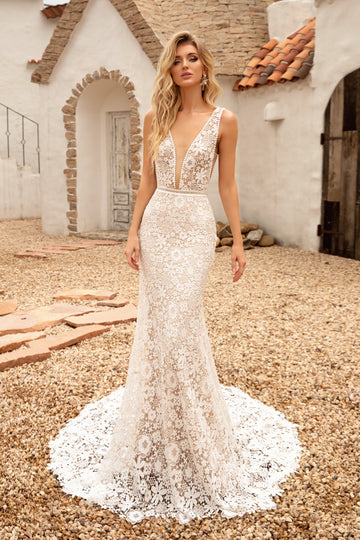Exploring Organic Textures in Wedding Gowns: A Trend for Modern Brides
Exploring Organic Textures in Wedding Gowns: A Trend for Modern Brides
The wedding gown is not just a dress; it's a symbol of love, commitment, and a new beginning. As the bridal fashion industry evolves, one trend is taking center stage: organic textures in wedding gowns. This blog post delves into what organic textures are, why they are gaining popularity, and how they can add a unique flair to bridal attire. Let’s explore how modern brides are embracing these natural fabrics and styles.
Understanding Organic Textures
Organic textures refer to materials and design elements that are inspired by nature. They often include fabrics that are not only eco-friendly but also offer a tactile experience that enhances the beauty of the gown. Common organic textures utilized in wedding gowns include:
- Silk: A luxurious, smooth fabric that drapes beautifully.
- Lace: Delicate and intricate, often featuring floral or vine patterns.
- Cotton: A breathable and soft option that embodies comfort.
- Satin: Glossy and elegant, ideal for structured gowns.
- Jute: Rustic and charming, suitable for bohemian-style weddings.
The Appeal of Organic Textures
Brides today are becoming more conscious of their wedding day choices. They seek outfits that resonate with their personal values, including sustainability and ethical fashion. Organic textures offer several advantages:
| Benefits of Organic Textures | Details |
| Sustainability | Many organic fabrics are produced using sustainable practices, reducing their environmental impact. |
| Unique Aesthetics | Natural textures offer a distinctive look that stands out compared to traditional synthetic options. |
| Comfort | Organic fabrics tend to be softer and more breathable, ensuring comfort for all-day wear. |
| Versatility | Organic textures can be adapted into various styles, from vintage to modern. |
Incorporating Organic Textures into Your Wedding Gown
If you're considering a wedding gown that utilizes organic textures, there are several design features to consider:
1. Layering Different Textures
Mixing and matching different organic fabrics can create a stunning visual effect. A layer of lace over silk, for example, can enhance the gown’s overall look while adding depth and dimension.

2. Floral Embellishments
Floral patterns made from organic lace or embroidery can add an ethereal quality to your gown. Opting for floral elements that are inspired by your wedding venue’s natural surroundings can personalize your look even further.
3. Choosing the Right Silhouette
The silhouette of your gown can greatly influence how organic textures are perceived. A flowy A-line gown allows for soft movement and displays the textures beautifully, while a fitted silhouette can highlight intricate details.
4. Consider Color Variations
While traditional white or ivory is the go-to for many brides, soft, muted tones inspired by nature can be equally stunning. Shades such as blush, sage green, or even light blue can evoke a natural feel and complement organic textures.
Popular Designers Embracing Organic Textures
Several bridal designers have made a name for themselves by focusing on organic textures. Here are some noteworthy mentions:
- Reformation: Known for its sustainable fashion practices, Reformation offers beautiful gowns made from eco-friendly materials.
- BHLDN: With a focus on vintage-inspired designs, BHLDN incorporates organic lace and natural fabrics into many of their styles.
- Grace Loves Lace: This brand emphasizes relaxed bridal styles using ethically sourced materials and unique textures.
Frequently Asked Questions
As brides seek to learn more about organic textures in wedding gowns, several common questions arise:
1. What are organic wedding fabrics?
Organic wedding fabrics include materials that are grown and processed without harmful chemicals. Examples are organic cotton, linen, and silk.
2. Are organic wedding gowns more expensive?
While some organic gowns may be pricier due to sustainable practices, many options are available at various price points, allowing brides to find the right fit for their budget.
3. How can I care for my organic wedding gown?
Always follow the care instructions specific to your gown. Generally, organic fabrics can be hand-washed or dry-cleaned using environmentally friendly solvents.
Conclusion
Organic textures in wedding gowns offer brides a beautiful and environmentally-friendly choice that aligns with modern values. By selecting fabrics that resonate with natural elegance, brides can create memorable looks that not only reflect their individual style but also consider the planet. Remember to explore your options, find a design that enhances these textures, and above all, choose a gown that makes you feel radiant on your special day. Organic textures are not just a trend; they represent a shift towards more thoughtful and sustainable bridal fashion choices.
As you plan your wedding, consider incorporating these organic elements into your dress, and let nature inspire your unique bridal story.
